
Waterloo student wins top co-op student of the year in Canada
Six students are honoured as the top co-op students in their Faculties at the University of Waterloo

Six students are honoured as the top co-op students in their Faculties at the University of Waterloo
By Staff Marketing and Strategic CommunicationsA Waterloo student who co-founded an oil and gas startup has won a national award for best co-op student of the year in Canada. He is among six students who received the University of Waterloo's top award for co-op students in their Faculties.
The Canadian Association for Co-operative Education (CAFCE) selected Andrew Andrade from Waterloo's Faculty of Engineering for its Co-op Student of the Year Award. Another Waterloo student, Skye Wattie, honoured as the top student in the Faculty of Arts, won a provincial award: the Education at Work Ontario Award for co-op student of the year.
These two students, along with one student from every other Faculty won Waterloo's top prize for co-op students of the year. It is recognition of their exemplary performance during a work term in 2014, along with other factors including community involvement, contribution to co-op and academic achievement.
“In a co-op program with 18,300 students, six remarkable individuals were selected to receive this prestigious award,” said Rocco Fondacaro, acting executive director of Co-operative Education and Career Action at Waterloo. “They personify Waterloo's drive to shape the future through innovation, boldness, and hard work. We are delighted to honour these students for their exceptional achievements.”
The following are the recipients of the 2014 University of Waterloo Co-op Student of the Year Award:
Andrew Andrade – Mechatronics Engineering (Engineering)
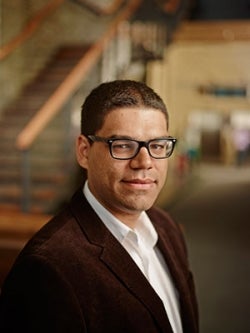 In his Enterprise Co-op work term, Andrew co-founded PetroPredict, a company that uses machine learning for risk modelling to inform oil companies about pipeline leaks that could cause environmental damage. PetroPredict won $25,000 at the Velocity Fund Finals as well as various other competitions. Andrew placed third in the Society of Petroleum Engineers Canada-wide graduate research competition for his work on artificial intelligence in the oil and gas industry. He leads technology development and research at PetroPredict, housed at the Velocity Garage, and supervises a number of new recruits, including co-op students.
In his Enterprise Co-op work term, Andrew co-founded PetroPredict, a company that uses machine learning for risk modelling to inform oil companies about pipeline leaks that could cause environmental damage. PetroPredict won $25,000 at the Velocity Fund Finals as well as various other competitions. Andrew placed third in the Society of Petroleum Engineers Canada-wide graduate research competition for his work on artificial intelligence in the oil and gas industry. He leads technology development and research at PetroPredict, housed at the Velocity Garage, and supervises a number of new recruits, including co-op students.
Andrew is a proud promoter of co-operative education and has given motivational talks in various high schools. An avid traveller, he is currently on an exchange in Singapore.
Liam Horne – Computer Science (Mathematics)
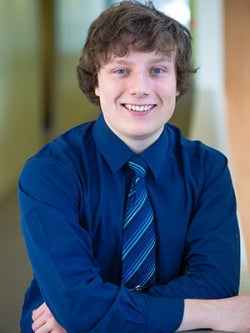 In the winter of 2014, Liam was a co-op student for Piinpoint, a Waterloo software startup that helps retailers determine the best locations to open shop. Within the year, he became the company’s Chief Technology Officer and leader of product development. Initially, Liam worked solely on writing software for PiinPoint’s platform, but he quickly became involved with business strategy, optimization of day-to-day operations, and managing the company’s growth of technology infrastructure. The company structure grew three times in size over this time. Today some of the largest retailers and real estate brokerages in the world use the platform.
In the winter of 2014, Liam was a co-op student for Piinpoint, a Waterloo software startup that helps retailers determine the best locations to open shop. Within the year, he became the company’s Chief Technology Officer and leader of product development. Initially, Liam worked solely on writing software for PiinPoint’s platform, but he quickly became involved with business strategy, optimization of day-to-day operations, and managing the company’s growth of technology infrastructure. The company structure grew three times in size over this time. Today some of the largest retailers and real estate brokerages in the world use the platform.
Liam is a founding organizer of Hack the North, Canada’s largest hackathon. Last September, he and his friends received sponsorship from many large and fast-growing technology companies, allowing 1,000 students to travel to Waterloo for the event.
Jessica Peixoto – Environment and Business (Environment)
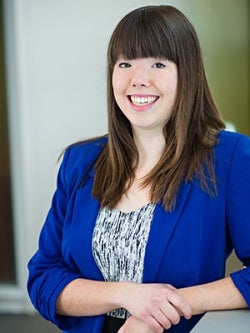 Jessica spent two of her work terms as a research assistant at Curtin University Sustainability Policy Institute (CUSP) in Perth, Australia. Her top accomplishments at CUSP were co-authoring the book, Sustainable Development Goals: Practical Steps Toward a Better World and assisting in the creation and implementation of a new doctorate program in sustainable development. Normally these assignments are given to master's students, but she excelled. She wrote an extensive program proposal and obtained approval and feedback from dozens of faculty, professionals and university staff.
Jessica spent two of her work terms as a research assistant at Curtin University Sustainability Policy Institute (CUSP) in Perth, Australia. Her top accomplishments at CUSP were co-authoring the book, Sustainable Development Goals: Practical Steps Toward a Better World and assisting in the creation and implementation of a new doctorate program in sustainable development. Normally these assignments are given to master's students, but she excelled. She wrote an extensive program proposal and obtained approval and feedback from dozens of faculty, professionals and university staff.
At Waterloo, Jessica is completing her fifth term as a residence life don and was previously a member of a residence council whose main function was to help students plan small events. She has volunteered for events on campus and in the community.
Laura Sevick – Biotechnology/Economics (Science)
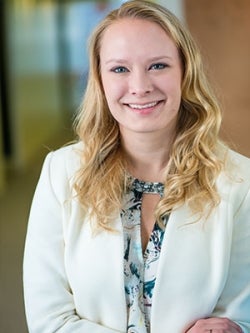 At St. Michael’s Hospital, Laura completed data analysis on curative chemotherapy for colorectal cancer patients. She presented her research at a variety of conferences including the GI American Society of Clinical Oncology conference in San Francisco. She was also a project manager for the COMET (Community Oncologists of Metropolitan Toronto) Clinical Trials Consortium (CCTC). The CCTC is a virtual network that links medical oncologists across the Greater Toronto Area (GTA) and surrounding region. Laura coordinated the re-launch of the network and ultimately ensured its success through problem solving. She helped improve website efficiency and met one-on-one with trials staff across the GTA to better illustrate the project goals, and encourage them to join the network.
At St. Michael’s Hospital, Laura completed data analysis on curative chemotherapy for colorectal cancer patients. She presented her research at a variety of conferences including the GI American Society of Clinical Oncology conference in San Francisco. She was also a project manager for the COMET (Community Oncologists of Metropolitan Toronto) Clinical Trials Consortium (CCTC). The CCTC is a virtual network that links medical oncologists across the Greater Toronto Area (GTA) and surrounding region. Laura coordinated the re-launch of the network and ultimately ensured its success through problem solving. She helped improve website efficiency and met one-on-one with trials staff across the GTA to better illustrate the project goals, and encourage them to join the network.
Laura spent two months volunteering as a pre-school manager in Ghanzi, Botswana and has also donated her time in Waterloo Region and on campus.
Skye Wattie – Psychology: Arts and Business
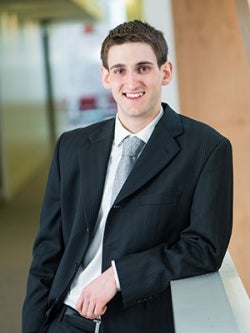 At RL Solutions, Skye handled the work of a full-time employee managing the implementation of risk-management software for the healthcare industry, generating $400,000 in revenue. For each project, he was in charge of all aspects of implementation: organization and management, client presentations, consulting, testing and client training. Skye’s innovation of new tools and a hands-on approach to training made it easier for clients to learn the software in less time. He attended a conference in California where he presented on change management.
At RL Solutions, Skye handled the work of a full-time employee managing the implementation of risk-management software for the healthcare industry, generating $400,000 in revenue. For each project, he was in charge of all aspects of implementation: organization and management, client presentations, consulting, testing and client training. Skye’s innovation of new tools and a hands-on approach to training made it easier for clients to learn the software in less time. He attended a conference in California where he presented on change management.
Skye is a residence life don and has received excellent reviews. He co-founded a national awareness and fundraising campaign, called Kilometres for Communication, for people who speak with augmentative and alternative communication devices.
Erin Wong – Kinesiology: Pre-Health Professions (Applied Health Sciences)
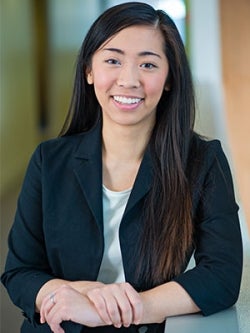 Erin worked as a clinical research assistant at Sunnybrook Health Sciences Centre for both her winter and spring 2014 work terms. She led the development of a research protocol for focused ultrasound that will significantly help in the treatment of bone metastases. She presented five oral presentations at the International Supportive Care Conference in Miami, Florida. While at the conference she received the Young Investigator of the Year Award for her oncology work. While at Sunnybrook, Erin assisted a social worker as a translator for Mandarin and Cantonese speakers so that they could communicate their homecare needs.
Erin worked as a clinical research assistant at Sunnybrook Health Sciences Centre for both her winter and spring 2014 work terms. She led the development of a research protocol for focused ultrasound that will significantly help in the treatment of bone metastases. She presented five oral presentations at the International Supportive Care Conference in Miami, Florida. While at the conference she received the Young Investigator of the Year Award for her oncology work. While at Sunnybrook, Erin assisted a social worker as a translator for Mandarin and Cantonese speakers so that they could communicate their homecare needs.
Erin’s interest in applied health sciences and community extends to her work on campus to promote mental health awareness through the UWaterloo Healthy Minds Group. As part of the Fu Hui Organization, Erin helps underprivileged children in China with their learning.
Erin received an honourable mention for the national co-op student of the year award from the Canadian Association for Co-operative Education.
In addition to the above students, Gillian Bedard (Applied Health Sciences), Chase Denomme (Arts) and Bryan Nerger (Engineering) received honourable mention for Waterloo’s 2014 co-op student of the year awards.
The Canadian Association for Co-operative Education leads National Co-op Week, which celebrates the growth of co-op education programs across the country. Waterloo is the world leader in co-op education, and is home to the world’s largest co-op program.

Read more
Meet the 14 exceptional students representing Waterloo’s newest grads

Read more
Waterloo welcomes emerging postdoctoral scholars to receive funding from Provost fellowship programs

Read more
The University of Waterloo celebrates the achievements of the newest pool of talented changemakers and wishes them success ahead
The University of Waterloo acknowledges that much of our work takes place on the traditional territory of the Neutral, Anishinaabeg, and Haudenosaunee peoples. Our main campus is situated on the Haldimand Tract, the land granted to the Six Nations that includes six miles on each side of the Grand River. Our active work toward reconciliation takes place across our campuses through research, learning, teaching, and community building, and is co-ordinated within the Office of Indigenous Relations.